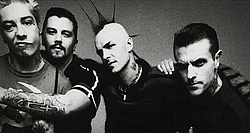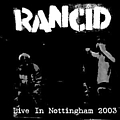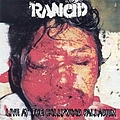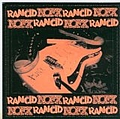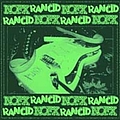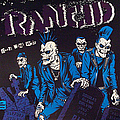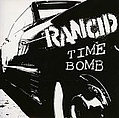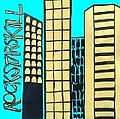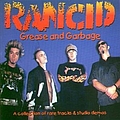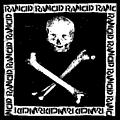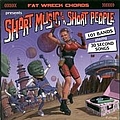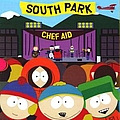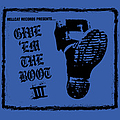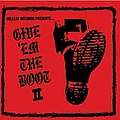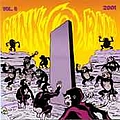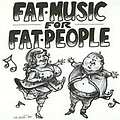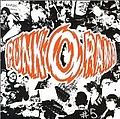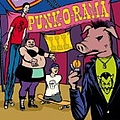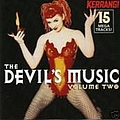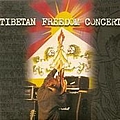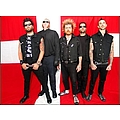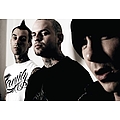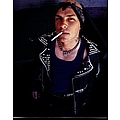Rancid Biography
Rancid is a punk rock band formed in Albany, California, United States in 1991. Founded by Matt Freeman and Tim Armstrong, both of whom previously played in ska punk group Operation Ivy, the band is credited along with The Offspring and Green Day with helping to revive mainstream popular interest in punk rock in the United States during the mid-1990s. The band currently consists of Tim Armstrong (vocals, guitar), Matt Freeman (bass, vocals), Lars Frederiksen (vocals, guitar), Branden Steineckert (drums). Born in the midst of the post-Reagan economic downturn in the San Francisco Bay Area, the East Bay region specifically, Rancid came to light as Armstrong and Freeman were moving forward after the first band they founded, Operation Ivy, reached a friendly demise. Arguably the most influential band from the Bay Area, the West Coast, the late 1980s or ever, depending on who you talk to, Operation Ivy has been cited by everyone from Green Day's Billie Joe Armstrong to Fat Mike of NOFX as the group that most affected the sound of their own bands. But just as those fledgling punk rock superstars' careers were getting started, Armstrong and Freeman were starting over. Encapsulated in a couple of lines off of Rancid's "Journey To The End of the East Bay," Armstrong succinctly explained the rise and fall of Op Ivy: "started in '87, ended in '89, you got a garage, or an amp we'll play anytime. It was just the four of us, yeah man, the core of us. Too much attention unavoidably destroyed us. Four kids on tour, 3000 miles, in a four-door car not knowing what was going on." Enter Brett Gurewitz, no stranger himself to blossoming from a rabid local following – in this case Los Angeles - to worldwide influence. Gurewitz was first known to Armstrong and Freeman as the guitar player and songwriter in legendary Los Angeles hardcore band Bad Religion, but by the early 1990s, Gurewitz was splitting his time between being a touring musician, record producer and the head of a swiftly growing independent label, Epitaph. A big fan of Operation Ivy, Gurewitz had once told Armstrong that whenever he started a new band, Epitaph would sign them, sight unseen. A few years later, he had his wish. Rancid's self-titled first full-length and Epitaph debut came out May 10th, 1993 and was filled with the ferocity of three guys (Armstrong and Freeman, along with original drummer Brett Reed) still living in squats, getting around on bikes or in old beaters and viewing the world with all the hostility of the very young and opinionated. Rancid had seen the American dream dwindle and fade in their country and in their community, saw its end trickle down into their families, and their early songs, like "Whirlwind" were filled with vivid descriptions of the aftermath. When the factory shut down so did the place he lived Blood money for junk bonds by a white collar fugitive All the tax free incentives ain't going to help him now Generations of job security gone out like the horse and plow Though free from any of Operation Ivy's signature ska/punk sound, Rancid Rancid took up the torch of social commentary and the examination of the local scene and instantly inflamed the newly revived punk community, setting the stage for what was to come. Rancid's Let's Go came out in June of 1994, just before Green Day's Dookie and the Offspring's Smash. Together, these records, along with Rancid's next release ...And Out Come the Wolves a mere 14 months later, would provide the soundtrack for youth in the US - and beyond - in the mid 90s, as punk leapt from relatively isolated local scenes onto the worldwide stage. Hailed by many critics as the next original phase of authentic American music, this catchy style of punk rock captured a moment in time and forever changed the face of popular, mainstream music. For better or worse, Tim Armstrong's mohawk was no longer a badge that would subject its wearer to suspicion and hostility on the street. Rather, in all its glory, it was emblazoned across the cover of Alternative Press magazine, followed closely by Spin, Details and others. Young kids rushed to copy it. Punk had officially arrived, dragging Rancid along with it. On Let's Go there were the songs "Radio" and "Salvation" that went on to become huge radio hits, but starts off with "Nihilism," a song that firmly cements Rancid in their natural space: the desolation of the poorer neighborhoods of the Bay Area, in particular the wrong end of Campbell CA, where new guitarist Lars Frederiksen grew up. And while the record went on to change the face of music, the first lines of the first song were unmistakably Rancid, with a keen eye for examining the ills of the world and a sharp tongue with which to lash it: Come into the Union District Drive down on Sharmon Palms White ghettos paint a picture Broken homes and broken bones Rancid was still making angry music; it's just now, the rest of the world was listening. ...And Out Come the Wolves had even bigger hit songs and went on to become Rancid's best selling record. More importantly, it highlighted the band's expanding sense of the world, as the local East Bay punks became internationally, world-touringly famous. The recording of the record was split between Berkeley and New York City, and Armstrong's poetic songwriting ranges from the autobiographical Bay Area tales that resonated so deeply on the first two records ("Daly City Train," the aforementioned "Journey to the End of the East Bay") to an equally personal tale of love on the road in "Olympia WA." The song "Junkie Man" was an almost sympathetic portrayal of a life ruled by addiction. The addition of the free form verse by famous New York poet/musician/addict Jim Carroll was just a lucky case of the band being in the right place at the right time. The success of Wolves landed the foursome on Saturday Night Live, more magazine covers and squarely in the sights of almost every major record label in the world. Madonna courted, A & R execs pursued, but in the end, Rancid remained loyal to their independent roots and to Gurewitz, who had lent his production talents to Let's Go and Wolves. It was a bold move that spoke volumes about the band as individuals and made them the stuff of D.I.Y legends. Rancid's next record, Life Won't Wait, was a sprawling, year-long project that found the band recording in Los Angeles, Jamaica, Brooklyn, New Orleans, New York and San Francisco and featured a lunatic roster of guest artists: Marky Ramone and Howie Pyro from the New York scene, Roger Miret of Agnostic Front, the swinging ska of Hepcat, the ever-controversial reggae star Buju Banton and more. The results were ambitious and internationally-flavored, drawing comparisons to the Clash's equally inspired Sandinista! but "for all the right reasons" wrote Rolling Stone in a four-star review. The one-two punch of Armstrong and Frederiksen's striking songwriting, usually couched in rowdy punk, was given room to breathe in an occasional slower song backed by horn arrangements, rockabilly bass lines and reggae rhythms. Local political recrimination was traded for a wider view as the band examined the effects of the reach of U.S involvement in an increasingly global economy. Salvador, Echo Park, Leister Square, Avenue C, Beijing, Warsaw, Afghanistan and Hollywood are just some of the places name checked on the record, illustrating a more mature, sweeping interest in world affairs. Coincidentally or not, at the same time the album was being written, Armstrong was seeking a change of pace and moved from the safety of Berkeley to Los Angeles. Wives were being met, squats traded for houses, and the band's progression made it into the tracks. Versatile and accomplished, Life Won't Wait was a growing-up on record. Two years later came another Rancid self-titled record, colloquially known as Rancid 2000, titled after the year it was released. After the expansive venture of Life Won't Wait, the band was ready to get back to their roots and crafted an intentionally combative collection of 22 hardcore songs, most clocking in at less than 2 minutes long. Again with Gurewitz at the helm, Rancid recorded the album down, dirty and quickly, mirroring their earliest studio sessions, trading polish for attitude and creating a pessimistic homage to the new millennium, filled with distortion and rasp. Once again tackling current crises, songs like "Black Hawk Down" and "Rwanda" continued the outward gaze and political accountability of Life Won't Wait, but "Let Me Go" bridges the gap between Rancid's penchant for calling it like they see it and their knack for self-examination: Bad generation polarized view No one leaves home to go and help you Watch CNN and then you know US bombs come down and what you gonna do? Boom boom boom look around There's no more roof no more house, no street, no town, Shot down - burnt black and brown - electrical meltdown You hear the sound of the U.S. bomb all around Oh it's a shakedown It's a break down Atomic sundown And then you know Correction, I need no direction Let me go just one last time I spent my whole life searching for direction Let me go just one last time Rancid's next, Indestructible, came out in August 19, 2003, a decade since the release of their first record, and they had become one of punk's most enduring champions. Whereas some of their earliest contemporaries had gone the way of pyrotechnics, stadium shows, and costume changes, while a younger generation of bands raised on punk brought the music to tweens and mall stores, Rancid had spent the last decade keeping on keeping on, never losing sight of themselves as a band or as individuals, and Indestructible showed a certain awareness of a changing environment and their place in it. Revered veteran music critic Robert Christgau called it "their warmest album ever," but it is the lyrics to "Start Now" that really illustrate a recognition of things as how they are and the wisdom of accepting the world on one's own terms: Another lesson has been learned, In this days' modern times, Strangers in the mist appear, Now there's war, all the time, Systematically go and destroy, Commit another atrocity, Aggressors are in their places, Man-made catastrophe. I'm not looking for a fight now, And I don't care who's wrong or right now, So release the dove into flight now, So we can start right now, We can start right now. In the almost six years since the release of Indestructible, the members of Rancid have been anything but dormant. 2004 saw the release of Frederiksen's second solo album Viking, a scorching homage to Lars' vida loca, equal parts violence and fellowship. 2005 marked the release of Haunted Cities, the second record from Armstrong's side project, the Transplants. Additionally, in 2007 Armstrong released an acclaimed solo record, A Poet's Life, a testament to his enduring love to reggae and rocksteady but also his interest how modern electronic music often mirrors old studio effects. Meanwhile, bassist Matt Freeman's legendary skills were highlighted on both the Transplants record and tour, and also on worldwide tours playing with Social Distortion. Seemingly, the band had so much creative output, it could not be contained within a single project. In 2007, Rancid had its only line-up change since the addition of Lars Frederiksen in 1993 when Branden Steineckert took over drum duties from Brett Reed. Let The Dominoes Fall is filled with songs that examine military service - timely in the midst of the US's protracted war in Afghanistan and Iraq, but also written for Armstrong's brother who served in Iraq. "New Orleans" pays homage to the band's love of the Katrina-wracked city and other songs examine the effects of eight years of irresponsible governance on the working class, but it is also a deeply personal, apolitical record. Many songs talk about a life lived on the road, lessons learned in a career now spanning more than a decade and a half. "Last One To Die" sums up the end results of Rancid's sometimes risky, often controversial choices. The moral of the story? You can never go wrong when being true to yourselves, a rule Rancid have always lived their lives, and flourished, by: Everybody said we gotta take a chance And tell them what the hell went wrong We only listened to the words that we sang Now a million are singing along. We got it right You got it wrong We're still around Last one to die Rancid as a band have always been imbued with a sense of place: the blue collar neighborhoods where they grew up, their place as individuals within their band, their band as part of a movement and their evolving sense of place in relation to the world at large. Rancid's new record Let The Dominoes Fall is much like their other records in the sense that it is filled with the stories and characters that populate the band's lives and reflects the cultural and political climate in which it was written and recorded. It has classic Rancid songcraft: two minute songs packed with melody, personally empathetic and politically denunciatory. But Let The Dominoes Fall is also unique in that it is filled with the growing insight of a band who has been doing this for a while now: it feels natural and organic, written without an agenda or a bone to pick, rather the culmination of lives lived largely with a keen interest in the world and a sense of brotherhood.
Top Rancid Lyrics
Write a comment
What do you think about Rancid? Let us know in the comments below!
Top Rancid Albums
Similar artists
- TransplantsPunk/Rock
- Tim ArmstrongPunk/Reggae
- Operation IvyPunk
- NofxPunk/Rock
- Time AgainPunk
- Left AlonePunk
- Social DistortionPunk/Rock
- Anti FlagHardcore/Punk
